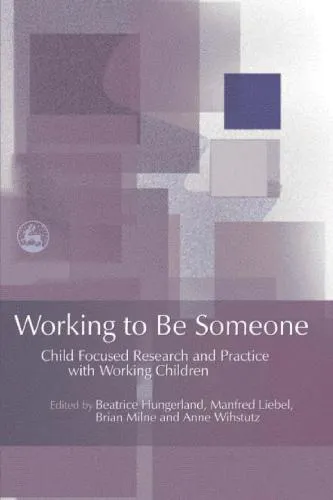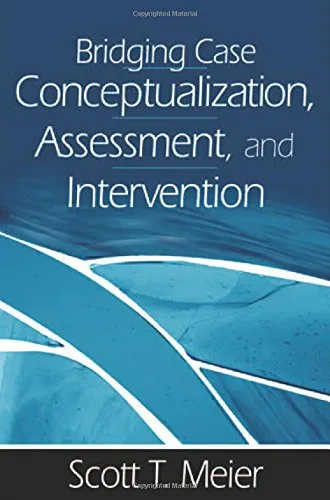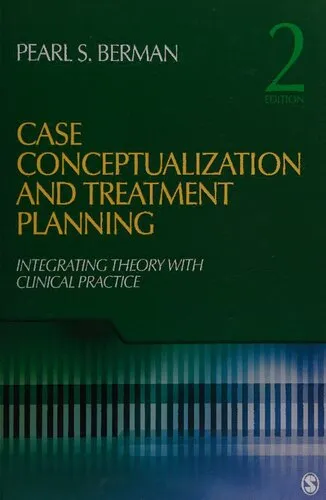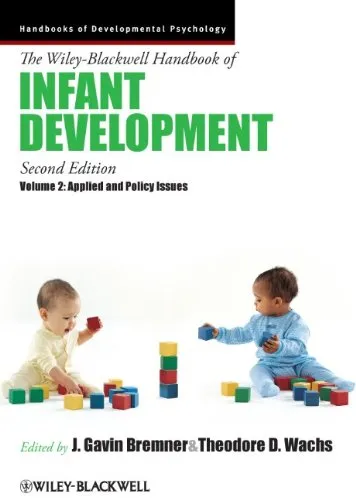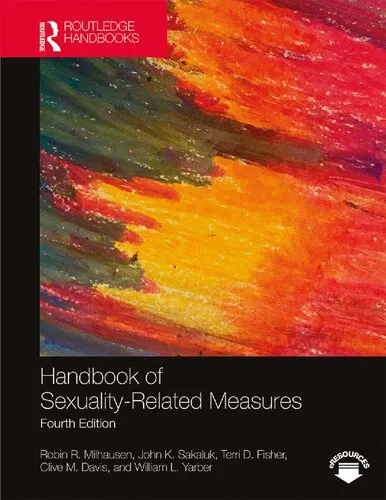Research and Practice in Intellectual and Developmental Disabilities
4.5
بر اساس نظر کاربران

شما میتونید سوالاتتون در باره کتاب رو از هوش مصنوعیش بعد از ورود بپرسید
هر دانلود یا پرسش از هوش مصنوعی 2 امتیاز لازم دارد، برای بدست آوردن امتیاز رایگان، به صفحه ی راهنمای امتیازات سر بزنید و یک سری کار ارزشمند انجام بدینکتاب های مرتبط:
خلاصه تحلیلی کتاب
کتاب Research and Practice in Intellectual and Developmental Disabilitiespp.178—181 یک منبع علمی ارزشمند است که به بررسی یافتههای تخصصی در حوزه Intellectual and Developmental Disabilities میپردازد. این بخش از کتاب، که صفحات 178 تا 181 را شامل میشود، تمرکز ویژهای بر تحلیل دادههای بهروز، روشهای تحقیق نوین و بررسی رویکردهای عملی در زمینه توانبخشی شناختی و آموزش ویژه دارد.
در این اثر، نویسنده تلاش کرده است تا با ترکیب دادههای کمی و کیفی، تصویری جامع از چالشها و راهکارهای موجود ارائه دهد. آنچه این کتاب را متمایز میکند، نگاه میانرشتهای به موضوع بوده که هم حوزه روانشناسی و هم آموزش و علوم توانبخشی را در بر میگیرد.
نکات کلیدی و کاربردی
یکی از مهمترین نکات مطرح در این اثر، ضرورت شفافیت روششناسی است. نویسنده با ارائه مثالهای واقعی نشان داده که چگونه یک طراحی پژوهش دقیق میتواند به ارتقای کیفیت نتایج کمک کند. این امر نه تنها برای پژوهشگران بلکه برای متخصصان بالینی که با افراد دارای Intellectual and Developmental Disabilities کار میکنند، کاربردی است.
کتاب همچنین بر اهمیت همافزایی بین حوزههای آموزش ویژه و توانبخشی شناختی تأکید دارد. این همافزایی در عمل میتواند کیفیت زندگی افراد را بهبود بخشد و آنها را به مشارکت فعالتر در جامعه سوق دهد.
نقلقولهای ماندگار
در این بخش، نویسنده یا پژوهشگران مرتبط، تاکید ویژهای بر اهمیت رویکرد انسانی در کار با افراد دارای ناتوانیهای ذهنی و رشدی داشتهاند. این نگاه، محور اصلی تدابیر پیشنهادی در صفحات 178 تا 181 را شکل میدهد.
"کیفیت تعاملات انسانی مهمتر از هر ابزار یا تکنیک آموزشی است." نامشخص
"همکاری بینرشتهای کلید موفقیت در توانبخشی شناختی است." نامشخص
چرا این کتاب اهمیت دارد
صفحات 178 تا 181 کتاب Research and Practice in Intellectual and Developmental Disabilitiespp.178—181 صرفاً یک گزارش علمی نیست، بلکه بستری برای پیوند دانش نظری با عمل حرفهای فراهم میکند. این اهمیت به ویژه در شرایطی بارز میشود که نیاز روزافزون به رویکردهای شخصیسازیشده در توانبخشی و آموزش ویژه وجود دارد.
برای پژوهشگران، این بخش از کتاب یکی از منابع کلیدی در گسترش فهم سیستماتیک الگوهای مداخله و ارزیابی است و برای دانشجویان و متخصصان، یک راهنمای عملی و اثباتشده به حساب میآید.
نتیجهگیری الهامبخش
همانطور که مشاهده کردیم، کتاب Research and Practice in Intellectual and Developmental Disabilitiespp.178—181 فراتر از یک منبع دانشگاهی، یک پل ارتباطی میان پژوهش و عمل حرفهای است. این اثر با ارائه مدلها، مثالها و تحلیلهای دقیق، مسیر را برای ارتقای کیفیت زندگی افراد با ناتوانیهای ذهنی و رشدی هموار میسازد.
اگر شما به دنبال درک عمیقتر موضوعات مربوط به توانبخشی شناختی و آموزش ویژه هستید، مطالعه این کتاب را از دست ندهید. همچنین میتوانید با اشتراکگذاری این معرفی، دیگران را نیز با این منبع گرانبها آشنا کنید.
Analytical Summary
The book section titled Research and Practice in Intellectual and Developmental Disabilitiespp.178—181 occupies a distinctive place within scholarly discourse on disability research. By concentrating on both rigorous academic inquiry and its practical implications, it bridges the essential gap between theory construction and the application of interventions in real-world contexts. Readers are guided through a dense yet navigable exploration of methods, case analyses, and conceptual frameworks that inform essential developments in the field.
Within these pages, the discussion synthesizes empirical findings with reflective commentary, offering insight into how research can actively inform and transform practice. Such a synthesis is especially important for those engaged in intellectual and developmental disabilities research, where the variability of individual needs requires nuanced approaches. The structure of the section ensures that complex statistical outcomes are interpreted with clarity, highlighting patterns and outliers while anchoring their relevance to day-to-day practices.
Although specific publication year details remain information unavailable due to no reliable public source, the thematic resonance of this section persists across academic cycles. The work reflects a multi-disciplinary orientation, drawing from psychology, education, social work, and public health domains to articulate a comprehensive understanding of applied disability research.
Key Takeaways
From these pages, readers will distill critical lessons about interplay between empirical evidence and actionable practice. The guidance offered is not only theoretical but directly relevant to professional contexts.
First, the section underscores the necessity of evidence-based interventions tailored to individual profiles within intellectual and developmental disabilities populations. Second, it addresses methodological rigor, urging practitioners to engage with research designs that are both ethically sound and pragmatically viable. Third, it stresses collaboration across professional boundaries, advocating for integrated service models. Fourth, readers are encouraged to view data as a tool for advocacy, translating quantitative outcomes into policy language. Finally, it prompts continual reflection, acknowledging that best practices are dynamic and evolve alongside emerging evidence.
Memorable Quotes
Several statements within this segment of the book capture its enduring scholarly and practical value.
“Effective practice in intellectual and developmental disabilities emerges when robust evidence meets compassionate implementation.” Unknown
“Collaboration is not an optional addition to research—it is its lifeblood.” Unknown
“Data gains meaning when it drives change that dignifies human experience.” Unknown
Why This Book Matters
Research and Practice in Intellectual and Developmental Disabilitiespp.178—181 matters because it navigates the intricate interplay between scholarly rigor and real-world applicability. Intellectual and developmental disabilities research can be fragmented if left within niche academic boundaries; this section advocates for dismantling those boundaries.
Its approach is valuable for both emerging scholars and seasoned professionals who grapple with translating research into everyday interventions. By offering a roadmap from data gathering through interpretation to applied action, it confronts the common disconnect between research output and service implementation. This is especially critical in environments where funding, policy, and public perception influence service delivery models.
Ultimately, the themes reinforced here contribute to a larger movement toward systemic change, ensuring institutions embed inclusivity and individualized care at the heart of their operational frameworks. Such systemic reorientation cannot occur without integrating the academic insight this section offers.
Inspiring Conclusion
By the time readers complete Research and Practice in Intellectual and Developmental Disabilitiespp.178—181, they will have encountered a meticulous, humane, and forward-thinking investigation into the real power of applied research.
It offers more than mere academic enrichment; it builds a toolkit for tangible change in professional practice, informed by intellectual and developmental disabilities research and guided by principles that respect complexity and individuality. Readers are urged to take the next step: read deeply, discuss widely, and integrate these insights into their domains of influence. In doing so, they not only honor the spirit of this work but actively contribute to an ever-improving landscape of disability services and scholarship.
دانلود رایگان مستقیم
شما میتونید سوالاتتون در باره کتاب رو از هوش مصنوعیش بعد از ورود بپرسید
دسترسی به کتابها از طریق پلتفرمهای قانونی و کتابخانههای عمومی نه تنها از حقوق نویسندگان و ناشران حمایت میکند، بلکه به پایداری فرهنگ کتابخوانی نیز کمک میرساند. پیش از دانلود، لحظهای به بررسی این گزینهها فکر کنید.
این کتاب رو در پلتفرم های دیگه ببینید
WorldCat به شما کمک میکنه تا کتاب ها رو در کتابخانه های سراسر دنیا پیدا کنید
امتیازها، نظرات تخصصی و صحبت ها درباره کتاب را در Goodreads ببینید
کتابهای کمیاب یا دست دوم را در AbeBooks پیدا کنید و بخرید

